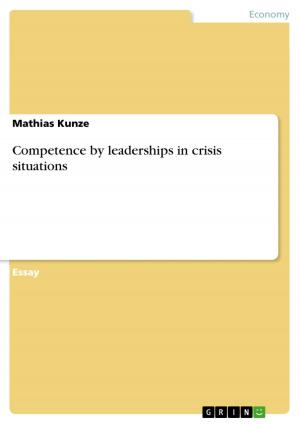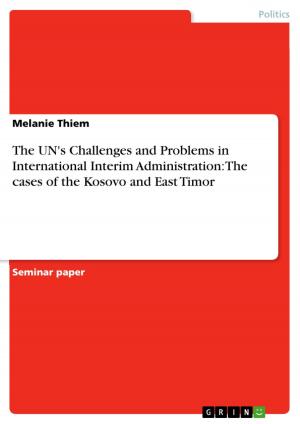| Author: | Hakime Isik-Vanelli | ISBN: | 9783638288088 |
| Publisher: | GRIN Publishing | Publication: | July 5, 2004 |
| Imprint: | GRIN Publishing | Language: | English |
| Author: | Hakime Isik-Vanelli |
| ISBN: | 9783638288088 |
| Publisher: | GRIN Publishing |
| Publication: | July 5, 2004 |
| Imprint: | GRIN Publishing |
| Language: | English |
Seminar paper from the year 2003 in the subject Business economics - Business Management, Corporate Governance, grade: Distinction, Bond University Australia, 17 entries in the bibliography, language: English, abstract: Abstract 'Communism was based on everyone being the same. Being different was a threat. Right now, Russian society is going through the painful process of reforming itself, and ridding itself of old ways of thinking. Although differences are officially allowed by the authorities great animosity still exists towards anything or anybody that is not average.' Marina Tyanhelkova, International Republican Institute Background to the Russian people The Czarist and Communist regimes have suppressed people's desire to work individually under personal initiative. During the restructuring period (perestroika), the Soviet Communist value system was redefined, but the pace of the restructuring has been very slow. Western values of individualism and profit maximisation are adapted to gradually, however many Russians, especially older Russians, have difficulty in adapting to a Western outlook on life. The older generation is generally pessimistic and does not have faith in a better future life, whereas younger urban Russians are more open to a Western lifestyle. Currently, Russia is going through a profound period of change to replace the values of Communism with those of democracy and a free-market economy. Visitors to Russia may find that many Russians are still unfamiliar with, or misinformed about, concepts that form the basis of Western business culture. It may be necessary to explain and persuade Russian counterparts to accept ideas such as motivation, fair play, individual accountability and reward, profit and loss, turnover, proprietary rights, good will, or public relations. However, these terms should only be used with tact and caution. One consideration to keep in mind is the widespread 'assumption' by Westerners that Russia is a very 'European' country. Discussions with several Russians have indicated that there is an affinity with Asia, and this should be kept in mind when assuming that Russia will converge to act more like North Americans or Europeans over time. Russians themselves often distinguish between Russia as a country and Moscow and Saint Petersburg as the most technologically and economically advanced cities in Russia. These two cities are relatively modern, meeting Western standards, and have experienced large-scale foreign direct investment in the past decade.
Seminar paper from the year 2003 in the subject Business economics - Business Management, Corporate Governance, grade: Distinction, Bond University Australia, 17 entries in the bibliography, language: English, abstract: Abstract 'Communism was based on everyone being the same. Being different was a threat. Right now, Russian society is going through the painful process of reforming itself, and ridding itself of old ways of thinking. Although differences are officially allowed by the authorities great animosity still exists towards anything or anybody that is not average.' Marina Tyanhelkova, International Republican Institute Background to the Russian people The Czarist and Communist regimes have suppressed people's desire to work individually under personal initiative. During the restructuring period (perestroika), the Soviet Communist value system was redefined, but the pace of the restructuring has been very slow. Western values of individualism and profit maximisation are adapted to gradually, however many Russians, especially older Russians, have difficulty in adapting to a Western outlook on life. The older generation is generally pessimistic and does not have faith in a better future life, whereas younger urban Russians are more open to a Western lifestyle. Currently, Russia is going through a profound period of change to replace the values of Communism with those of democracy and a free-market economy. Visitors to Russia may find that many Russians are still unfamiliar with, or misinformed about, concepts that form the basis of Western business culture. It may be necessary to explain and persuade Russian counterparts to accept ideas such as motivation, fair play, individual accountability and reward, profit and loss, turnover, proprietary rights, good will, or public relations. However, these terms should only be used with tact and caution. One consideration to keep in mind is the widespread 'assumption' by Westerners that Russia is a very 'European' country. Discussions with several Russians have indicated that there is an affinity with Asia, and this should be kept in mind when assuming that Russia will converge to act more like North Americans or Europeans over time. Russians themselves often distinguish between Russia as a country and Moscow and Saint Petersburg as the most technologically and economically advanced cities in Russia. These two cities are relatively modern, meeting Western standards, and have experienced large-scale foreign direct investment in the past decade.















